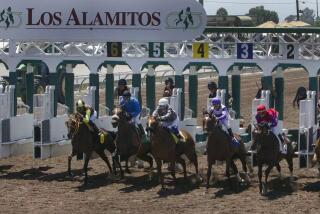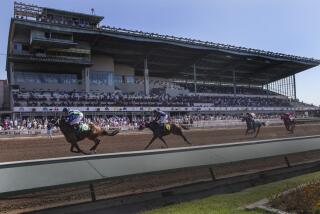Fatal Mystery Down Under : Trainer, 14 Race Horses Die of Unknown Cause
- Share via
MELBOURNE, Australia — Fourteen thoroughbreds were dead. And trainer Vic Rail, once famous for his association with a remarkable horse, lay critically ill in the intensive care section of a city hospital.
No cause could be established for either. There was speculation that the afflictions could be related, except that medical experts--both human and equine--said it was impossible for a man to catch a disease from a horse.
For the record:
12:00 a.m. Oct. 5, 1994 For the Record
Los Angeles Times Wednesday October 5, 1994 Home Edition Sports Part C Page 7 Column 1 Sports Desk 2 inches; 44 words Type of Material: Correction
Horse racing--A story in Tuesday’s editions on the mysterious racehorse illness in the state of Queensland, Australia, erroneously said that it is impossible for a man to catch a disease from a horse. Many diseases can be transmitted from horses to humans, among them glanders, anthrax and equine encephalitis.
In the Queensland capital of Brisbane, where this mystery was unfolding, race meetings were canceled, at a cost to the industry of millions of dollars.
As Australian and international experts analyzed tissue and blood samples without being able to offer a definitive explanation, the vacuum of hard facts was filled by a whirlwind of speculation.
In Melbourne, where Rail had become such an unlikely public figure, the Age, a newspaper, filled in the gaps in its front-page story by resurrecting a plot from a novel by Englishman Dick Francis, the former jockey-turned-best-selling author.
Rail, 49, died of heart failure a week ago in Brisbane’s Mater Hospital. He had been one trainer who would not observe the usual racing protocol of being purely the straight man in a performance in which the horse, if it wins, always gets the best notices.
Rail and Vo Rogue stood that practice on its head.
Vo Rogue was bought for $5,000, the equivalent of $3,750 in American money, as a weanling, the offspring of a sire and dam who had not won a race between them.
Initially, it seemed the horse would run true to its humble origins. A part-owner’s first impression was that the horse was “a bit of a rat.”
Vo Rogue’s owners sent him to the stables run by Vic--short for Victory--Rail, one of eight children from the north Queensland city of Townsville, whose given name was bestowed by elated and historically minded parents to mark his birth date, Aug. 15, 1945, the day World War II ended when Japan agreed to surrender.
Rail was a steeplechase jockey and boxer who rode Vo Rogue in all his workouts at 185-195 pounds.
And Vo Rogue soon made believers out of skeptics and fans out of spectators with his style of racing.
With each victory, and each new and successful incursion south from Brisbane, Melbourne’s race goers took Vic and Vo ever closer to their hearts.
After each victory, Rail would hold court.
“Mate,” he said, after being called upon to part with some training secrets, “he gets no steroids, no vitamins, no nothing.”
Rail’s horses also trained without shoes and would have raced that way if the stewards hadn’t suggested otherwise.
Nor was Rail above reminding some of his well-connected rivals, such as Melbourne Cup-winning trainer Lee Freedman, what might be awaiting them.
“You tell Lee Freedman to get his horse to have a real good look at my bloke’s head on the training track, because once they’re in a race, all he ever sees of my bloke is his backside.”
Beneath the laid-back humor and unorthodox training methods, though, was a real success story. Rail’s first and only big winner earned $3.1 million.
Leg injuries eventually brought Rail’s express to a halt. Vo Rogue was retired at the end of 1991, and apart from the odd minor success, that was the last the sporting public heard of Rail.
In the final months of his life, Rail was facing problems on at least two fronts.
A troubled personal life had led to an apparent addiction to sleeping pills, with friends quoted as saying he was taking as many as 12-14 daily.
And there were suggestions that pills prescribed to other personnel in his stable were being consumed by Rail.
As this dosage took its toll, it appears that hygiene at the stable began to suffer.
Rats infested the stable complex that Vo Rogue’s winnings had helped to buy in the Brisbane suburb of Hendren.
“As big as small cats,” according to local residents, the rats could lift drainage grates and enjoyed the run of the stables.
The first horse to die, a broodmare, fell ill on Sept. 9 and had to be destroyed. Two days later, Quegent, the best horse in Rail’s stable, a winner in Melbourne, also fell ill.
And Rail himself was sick with a high temperature, uncontrollable tremors and difficulty breathing.
Eight days later, nine more horses had become stricken. Their trainer had been sent to bed.
By Sept. 20, Rail had been admitted to a hospital. Two days later, seven of his horses had died along with another from a neighboring stable.
Racing and government authorities were notified, and a three-mile exclusion zone was declared around the stables, prohibiting the movement of horses in or out of the area.
Also falling within the quarantined area were Brisbane’s two racetracks, Doomben and Eagle Farm.
That same day, the weekend’s racing in southeast Queensland was canceled. The cancellation was later extended to last weekend, and included a race meeting in northern New South Wales, south of the Queensland border.
Rail was treated for Legionnaire’s disease while in the hospital but tests before and after his death were inconclusive and the cause of his death has not been determined.
Tissue samples from his liver, as well as from the horses and rats, have been tested at the Commonwealth Scientific and Industrial Research Organization’s animal health laboratory near Melbourne, at that city’s Fairfield infectious diseases hospital, and at the Centers for Disease Control in Atlanta.
Scientists at each have reportedly said they have no idea what caused the deaths.
More to Read
Sign up for Essential California
The most important California stories and recommendations in your inbox every morning.
You may occasionally receive promotional content from the Los Angeles Times.










